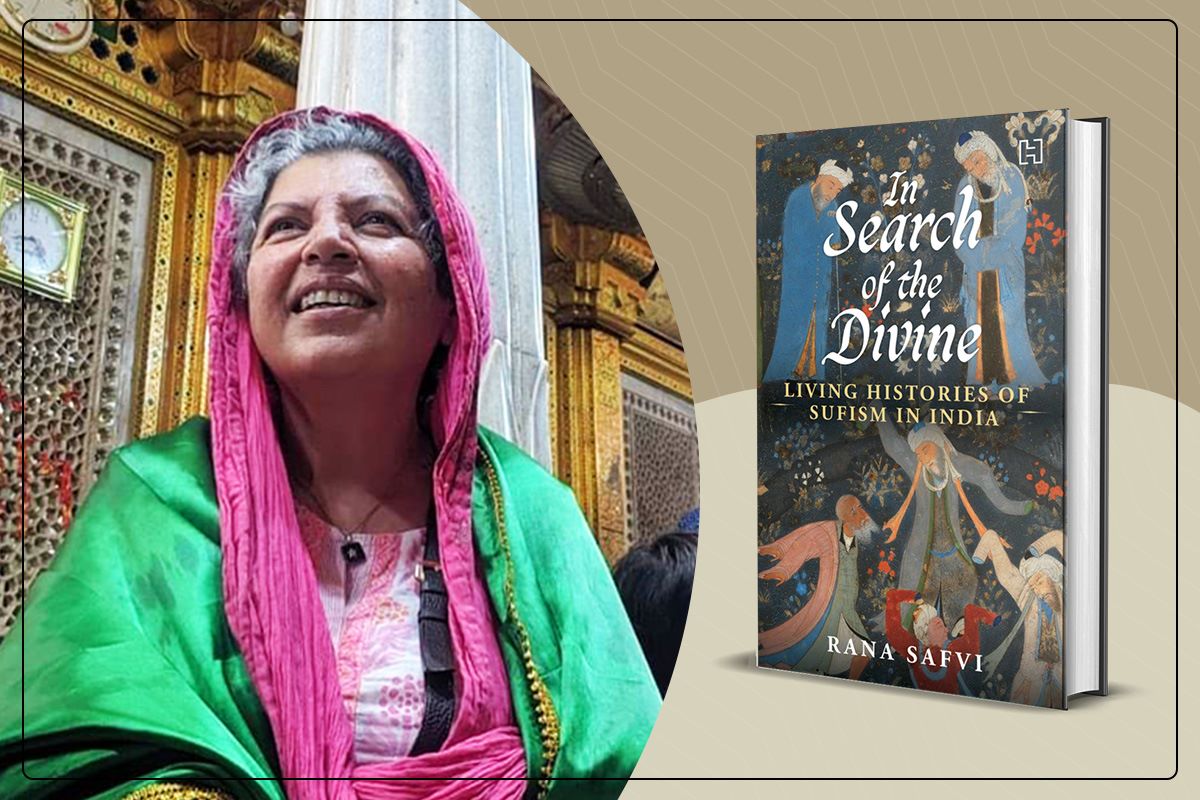
Scholar, historian, translator, and author Rana Safvi is an authority on Delhi and its cultural heritage. Her latest book, In Search of the Divine, is a deep dive into Sufism and its lost history. She tells us about the initial idea of the book, the narrative that emerged from her research, and other essential reading on the subject. By Paridhi Badgotri
A Conversation with Rana Safvi
Kunzum: What made you write a book on Sufism?
Rana Safvi: This book was actually commissioned by Hachette—by Poulomi Chatterjee who was the chief publisher then—but the shape that I gave it was my own. She said that she wanted something on the practices of Sufism in India. When I started researching and writing them, the canvas became far broader and far more personalised and experiential than what she had meant. But after she told me that she wanted a book on this topic, I had the freedom to do it whichever way I wanted—and I wanted to make it academic as well as [based on] personal research. On my own, probably, I would not have gone into this field at that point. But I never say no to anything. So, for me, it was a challenge. And I’d already been writing about dargah—but I was writing about it from a historical point of view; exploring it spiritually was just the next step.
Kunzum: You highlight the role of women in Sufism in your book. Where did you find that strand of narrative?
Rana Safvi: Isn’t there a saying that Islam did not rise except through the sword of Ali and the wealth of Khadija? The first wife of the prophet, Khadija, was instrumental in the spread of Islam, because she was one of the richest persons in Mecca and it was her money that was used initially. Women have always been very strong and had have been role models in Islam. That’s why I wanted to talk about them, and as far as Sufism is concerned, when you think of the way we perceive Sufism today—as an ecstatic expression of love—that was also given by Sufi saint Rabia al Basri in the eighth century from Basra.
Kunzum: Many people today, not necessarily from Islam, are interested in Sufism but don’t know its history. What led to its creation?
Rana Safvi: During the expansionist phase of Islam, people felt that the spirituality in which Islam was based had been lost. So, a group of mystics who were given the name of Sufis, who wanted to explore and concentrate on the spiritual side of Islam and live an ascetic life, not concerned about the political aspects of it. If you see [in history], the saints do not interact much with the rulers, it’s only later on that saints were also interacting with the rulers of some silsilas. The silsilas got organised only in the 13th century. In the beginning, it was only individuals.
Kunzum: How did Sufism reach India?
Rana Safvi: Sufism travelled to India in the 10th century, so it’s medieval and comes with soldiers. The saints came with the army. Muhammad Bin Qasim Hussain was one of the first people, then Dātā Ganj Bakhsh came to Lahore in the 11th century, and later, Moinuddin Chisti came to Ajmer in the 20th century.
Kunzum: What do you think about the current representation of Sufism in music?
Rana Safvi: They are just what a layperson thinks Sufism is supposed to be. In the book, I’ve described that for Sufi, or Sama, music to be actually mystical there are many conditions that have to be met; if you are hearing some music on the road or in a film, it can have Sufi influences but cannot be called Sufi music. In a Sama mehfil, people are in a heightened state of devotion, their minds are already stimulated, they are closer to God—and when they hear this music, it stimulates them further. And there are limitations: it has to be devotional, in the praise of god or the Prophet, and it has to be sung in such a way that stimulates you—your contemplation becomes internal.
Kunzum: Which books would you recommend on Sufism?
Rana Safvi: My favourite books that I have read thoroughly and recommend include Saiyid Athar Rizvi’s book A History of Sufism in India, because that is the most exhaustive book on Indian Sufism. In totality on Sufism, I would recommend Carl Ernst, Bruce Lawrence, Annemarie Schimmel, and Seyyed Hossein Nasr—they’re all very good writers.
Related: I Enjoy Screenwriting the Most: Poet & Fiction Writer Rochelle Potkar Gets Candid with Kunzum

1 thought on “In Search of the Divine: Rana Safvi on her Sparkling Foray into Sufi History”